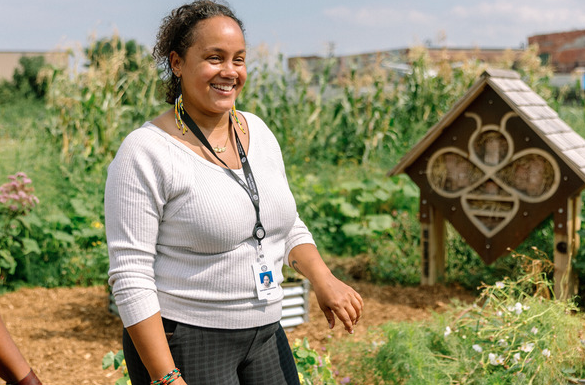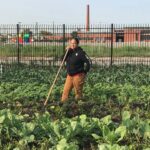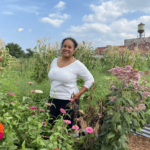
- Kim Kisner
- Community
- 05/07/2024
Investing in Solar and More for Detroit Neighborhoods

In March, Mayor Mike Duggan named longtime urban farming activist Tepfirah Rushdan as the city’s new director of sustainability. Rushdan was serving as Detroit’s first director of urban agriculture, where she worked to encourage urban farming by improving city policies and streamlining processes. Rushdan is helping lead the process of selecting a new director of urban agriculture, a position that will report to her.
Rushdan also previously acted as codirector at Keep Growing Detroit, whose mission is for the majority of fruits and vegetables consumed by Detroiters to be grown in the city. She also is a co-founder of the Black Farmer Land Fund. She serves as treasurer of the Detroit People’s Food Co-op and is a cofounder of Black to the Land Coalition, which connects BIPOC people to outdoor recreation. She is also a board advisor to several other community projects and has formerly held seats at the Detroit Food Policy Council and the Uprooting Racism Planting Justice initiative.
In her new role, Rushdan will lead the city’s priority actions within the four main goals of the Detroit climate strategy:
- Transitioning to clean energy
- Increasing sustainable mobility
- Accelerating energy efficiency and reducing waste
- Prioritizing vulnerable residents and adapting to change
- Reducing flood risks
- Protecting from extreme heat
- Improving air quality
SBN Detroit interviewed Rushdan about her role, the challenges, and the opportunities.
Q: How will you approach the four main goals of the Detroit climate strategy?
A: The key for us to work across all departments within the city. There are some real champions in place who want to meet these goals and are already working to do so.
My approach to tackling the four main goals involves fostering collaboration and synergy across all city departments. We are actively building out our capacity within my department to ensure that every arm of our municipal operations contributes to realizing our citywide sustainability vision.
Q: You’ve said that you believe Detroit has real potential to become a national leader in municipal sustainability. What is your vision behind this?
A: Being in Michigan, we have so many natural assets. Also, Detroit brings some things that may be seen as deficits, like vacant land and blighted areas, but I think these are big opportunities for us. It’s a chance to rethink what the city will look like in the coming years.
Coming from an urban farming background, I’ve been thinking about the potential of this vacant land for many years, and I’m excited to find ways to repurpose it toward environmental goals – whether that’s farming, pollinators, solar, or other things.
Also, Detroiters have grit. This is a city that’s been largely disinvested in, which has fostered strong resilience in our spirit. There is great potential here.
Q: A major immediate focus is the city’s solar neighborhood project, which will replace up to 250 acres of vacant, blighted land in up to six neighborhoods with solar arrays that will create enough clean energy to power all of the city’s 127 municipal buildings. Can you tell us more about this project?
A: This was largely driven by the people in the communities. The city put out a questionnaire regarding what the residents would like, and 19 groups responded saying they’d like to utilize the vacant land for projects. This city has met with them alongside other stakeholders and partners to determine what this might look like for the neighborhoods, the logistics of the sites, and so on.
We currently have eight potential sites, and we are in meetings with the council to discuss moving forward with three of them for Phase One. We have selected two potential developers.
The developers will work closely with the residents to lay out what the sites will look like in terms of design and aesthetics and work hand-in-hand with the neighborhoods.
If all goes well with the city council, we’ll be able to start building as early as this fall.
Q: What are the challenges of the project?
A: I think there is a big opportunity to educate the public about climate change the issues that are at the forefront.
It’s a chance to invest in the neighborhoods – communities that have not seen investment in years. This is a chance to spread that out.
We’ll also be developing in the immediate areas around the footprints of the sites, investing in housing with energy upgrades, and more.
So, I think it’s a chance for us to rise to the challenges of meeting the goals that the state of Michigan, the federal government, and the United Nations have outlined. This will take everyone working together including residents, businesses, and organizations.
Q: Overall, do the city’s sustainability goals involve or play into workforce development?
A: I’m proud of the work the city is doing around developing our workforce to be ready for the green economy. That’s pivotal. I want to highlight the Detroit At Work program where residents have opportunities to access careers and training. In fact, one of the new training options is around electric vehicle charging. The city is looking forward in terms of where the workforce needs to be and putting things in place for job creation toward these things.
Q: What impact do you think your work will have on businesses and the economy?
A: Sustainability is not exactly sexy. It takes a lot of work, commitment, and collaboration between businesses, residents, and all stakeholders. Business communities are driving our economy, so we need to be thinking about working alongside businesses to make sure their practices are sustainable.
We all have to rethink how we are doing business and working together as a whole to reach our goals.
Also, recently the city council unanimously passed the Energy and Water Benchmarking Ordinance requiring buildings with over 25,000 square feet of space to annually report their energy and water usage. This data will be gathered, and learnings and insights will be shared with other large business owners. Other cities have done this, and it’s been helpful.
Q: What impacts are you most looking forward to having as you step into this new role?
I’m a community person. I’ve been working in the trenches for 15 years and have had the opportunity to meet great people. So I’m thrilled to bring the community perspective of sustainability into this role. We must develop not only the logistical pieces of transitioning to clean energy but the hearts and minds and culture as well.
I think Detroit is ready for this. Ready to take the environment seriously and account for the harm we have all done and what we are left with and make sure we are turning the tide.
That is the most exciting thing for me now.
Be sure to subscribe to our newsletter for regular updates on sustainable business practices in and around Detroit.
Kim Kisner
- All
- Business
- Community
- Education
- Events

Unique Monique Scented Candles, a Detroit-based business founded by Monique Bounds., aims to produce candles and household products with clean ingredients and local supply chains. What began as a personal hobby during college has evolved into a full-time venture producing coconut oil and soy-based candles made with essential oils and locally sourced materials. SBN Detroit interviewed Bounds about launching a sustainable product line, sourcing challenges in Michigan, and...

Eastern Market Partnership, in collaboration with the City of Detroit’s Office of Sustainability Urban Agriculture Division, has announced $240,000 in grant funding to support Detroit-based farmers and farmer collectives. The grants will advance food access, climate education, sustainable land use, and economic opportunity, with priority given to Black- and Indigenous-led farms, youth-led initiatives, and projects rooted in historically disinvested neighborhoods. The recipients – ranging from cooperatives and community...

Citizen Robotics is a Detroit-based nonprofit that advances the use of robotics and digital manufacturing in residential construction, focusing on improving productivity, sustainability, and long-term affordability. Best known for its early work in 3D-printed housing, it explores how alternative construction methods and new financial models can reduce material waste, lower lifetime operating costs, and enhance the resilience of homes. SBN Detroit interviewed Tom Woodman, founder and president of...







